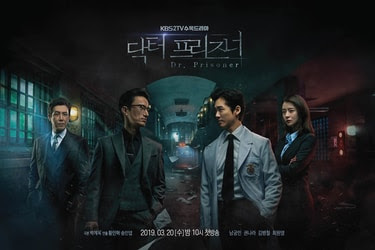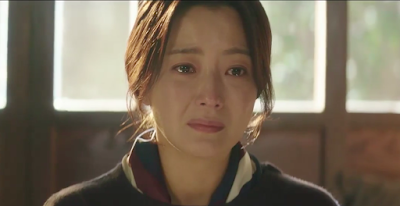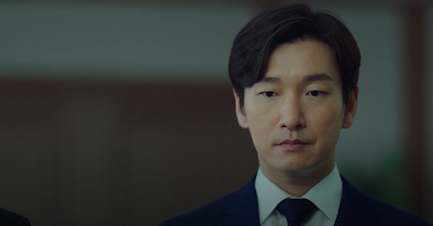The post consists of spoilers from the entire series. Read at your own risk. :D
Now perhaps that I'm in a calmer state of mind, it's a good time to take stock my feelings about this show.
First of all I should say that despite the nonsensical ending that we got it wasn't a terrible show. It was, at the end of the day, however, a waste of a fascinating concept and a stellar cast. The end result was ambitious mediocrity leading to more questions than answers. Looking back, the first six episodes were really good television... not just good sci-fi. In the early days I had high hopes for it as it seemed like the production team was determined to get it right with its high production values, intriguing storyline and terrific cast of characters. The set-up was genuinely good.
I should have cottoned on to the fact that something was a bit fishy in Denmark when the show's claims that it was dealing with parallel universes turned out to be a mischaracterization. Tae-yi's initial movements suggested that she'd created an alternate timeline. But then the presence of Alice and time travel tourism pointed to a causal loop in operation. However when Jin-gyeom comes face to face with Professor Tae-yi, his mother's doppelganger and their relationship develops ambiguously with romantic overtones... we're told she's not really his mother because we're dealing with parallel universes here. She's just someone who happened to look exactly like his mother from another world with the same birthday, Yoon Tae-yi the creator of time travel. Not long afterwards, Jin-gyeom gets his first taste of time travelling, heading straight for the year that mother died. Despite foreknowledge, he is helpless to stop it. This scenario is later repeated in varying forms which points to time looping.
Okay let's for argument's sake that we concede that the show is playfully deploying different time travel devices satirically throughout the drama's run. Can't be any harm in that surely? Well, that depends. Are we dealing with an episodic drama with multiple storylines (like Star Trek or Stargate) or one single complete arc. If the show is what I believed it to be then no, it doesn't work... it's inherently problematic. Doing a time travel smorgasbord not only means that there can be no clarity about the actual relationship dynamics. Picking and choosing tropes like taking items off the local convenience store will inevitably see a clash of logic and rule breaking. These tropes don't mesh well together. For example if Professor Tae-yi is from an alternate timeline that Mother Tae-yi created she might be said to be a different person. But it doesn't explain how or why the Alice crew are operating if that's the case. Why are they in that timeline, not in the one that Min-hyuk and Tae-yi came from originally? Are there different Alices in different timelines? This also has implications for the so-called "romance". If we're dealing with a causal loop then Professor Tae-yi is merely Mother Tae-yi's younger self then as the show doles out the rom com cliches when they play house the relationship between Prof Tae-yi and Jin-gyeom has incestutous overtones. If however, they are all operating on a different timeline, the professor might be a different self. Whether that makes a romantic relationship more "acceptable" between them, is up for debate. What compounds the unclarity is the fact that there are people who are travelling back and changing the past in the early days who haven't created new timelines... at least not that we can see. Future selves go back to the past and change the past but they're unaffected seemingly. Hence the show doesn't grapple (like Train does) with the logical complexity of any time travel trope.
There are other reverberations resulting from Jin-gyeom's growing bond with Prof Tae-yi. Even if she's a different soul or self, the oedipal ramifications can't be so easily dismissed. His "attraction" to her is that she looks like mother. So when he plays house with her... and unbeknownst to her as well... he is reenacting his regrets concerning his mother sort of like playing with a doll when you can't have the baby. To the writer's credit, that very point is highlighted later on when she sees a photo of mother. But that is not exactly the best foundation for any romantic relationship. To be liked for you might be not who you actually are. I've said this in an earlier post so I'm sounding like a broken record. I have little doubt that they went for t the alternate timeline approach so that they could have this kind of dynamic between the top billed actors without the ick... except that they never... it seemed to me... resolved the optics of the situation to the satisfaction of most viewers.
For me personally what went wrong was two-fold. Firstly, the focus on message over messaging. It feels now that despite my early hopes, that they weren't' careful about the time travel side of things. Despite the use of scientific jargon, the show glossed over the implications of using language like parallel universe rather than alternate timeline. For me those are two entirely different mechanisms at play. Then we had Jin-gyeom trying to stop his mother from being murdered which look a bit like causal looping or time looping (Groundhog Day). That was very confusing. And then finally the introduction of Old Jin-gyeom which was intriguing, arbitrary and possibly quite nonsensical. It seemed to be a kind of a deus ex machina to explain the Teacher death cult but his presence at the 11th hour throws up even more questions while sidestepping any answers. For a powerful figure he seemed rather impotent in the end. Their showdown was a non-event. I was led to believe that Jin-gyeom was a one-time only phenomenon because of what Tae-yi did in 1992 so if Old JG was a much more powerful experienced version of young Jin-gyeom, why didn't he act sooner rather than wait till his younger self become more attuned with his abilities. If there's no grandfather paradox, why not kill off JG or take control of him before he became a cop? If he had to be introduced, it should have been much earlier.
Secondly the need to put Jin-gyeom and Tae-yi front and centre of the storyline railroaded the storyline. I understand that they are the top billed actors but did they have to be in a relationship with romantic overtones? But Hospital Playlist proved that you can have a hugely popular loveline between a main character and a supporting one with a large ensemble cast. In fact many were very supportive of a JG and Do-yeon outcome. Most of us were labouring under the impression that this show was about the ensemble cast. Now, it could be that was always the story they wanted to tell. Mother and son. A woman who looked like mother. The pair are drawn to each other. Perhaps it even bodes romance for them. So why bother with the crime, thriller aspect at the start, setting a particular tone for the rest of the show. Why introduce a cast of characters who barely get used in the second half of the show when they have skill sets that aren't utilized properly to solve the mysteries. To be honest, I didn't find their relationship particularly compelling. It was fraught with too much baggage from the start. My preference would have been to focus on the history of Alice and the crime aspect of the show. It's not to say that Joo-won or Kim Hee-sun aren't great actors because they are but I thought that Kim Hee-sun particularly was badly served once the time travelling started. After a while, her entire arc felt repetitive and she was doing what I thought other people should be doing instead. This is where I think, the writer's inexperience shows.
If there was one thing that the show got right from start to finish, it was the stuff about families. I just wish it had stuck to the importance of families and kept things tidy in that regard in order to focus more on the crime-time travelling aspects. I loved JG's surrogate families more than TY's family because they were so much better developed and incorporated. It's lamentable how underutilized Do-yeon, Detective Kim and Min-hyuk became in the second half. It's my biggest disappoint with the show and in the hands of a more seasoned writer, I think this would have been better handled.
What I wrote elsewhere about the ending...
I don't have any objections to happy endings but this is ridiculous. This wasn't a happy ending... this was the show forcibly reminding us who the leads of the drama are at the cost of storytelling. Park Jin-gyeom... someone who apparently shouldn't have existed and with memories of Yoon Tae-yi... is now an architect in 2020 doing restorations of historic homes because apparently he just fell from the sky and inserted himself into the populace behaving like a well-adjusted human being. Where does he come from? Who are his parents? What's he doing in 2020? Why does he have memories of TY? Are they gunning for a second season? If they are, you can be sure, I won't be signing up for it.
So what is the show saying... that this Park Jin-gyeom who fell from the sky and this Prof Yoon Tae-yi have a completely clean slate and they can find their happily-ever-after in each other? There's nothing icky right... except there is. Because he has memories of her. She has memories of him too. He's not a completely different guy. Unless he's suffering quantum entanglement issues too. But he shouldn't right... because the door's been closed on time travel and everything's has been reset. No wonder everybody's confused. It flies in the face of the show's own claims about what's going on.
So why was Tae-yi running around the place like a headless chicken demanding to know where Detective Park Jin-gyeom was. That was utterly silly. Shouldn't she have twigged by the time she got to the police station that a reset had occurred? You know, the reset that she and Mother Tae-yi talked about two three episodes ago. Kim Hee-sun is a great actress but I've shaken my head at the things they've made her do as Prof Yoon Tae-yi. They obviously wanted to give her a bigger role when the actual story didn't warrant it. They had a great ensemble cast... and they wasted the talent pool.
It's not hard to see why they wanted Tae-yi to retain her memories prior to the reset... because oh no... we can't have her trying to get time travel up and running again. But the problem with that is the show never tells us what the agency behind everything is. She was very dead the last time we looked. Did God or the universe give her that kind of insight? If the show was going for an esoteric answer then it should have said so much earlier. Rather than have Seok O-won muttering something about the mysteries of the universe. Sheesh... what a cop out.
I keep wondering what went wrong with the show. The bottom line for me is that they went for the message without taking care of the messaging. They consistently broke their own rules. Out of the mouth of one person they talk about alternate universes, then from another it's parallel dimensions... if that wasn't confusing enough... we have Groundhog Day on steroids with no sense of who's who. "You can't stop my death. Mea culpa." Okay lady... we got it the third time. And then when the two JGs squabble over mother's love, she turns the weapon on herself. Why did she run from the drone in the first place?
The last episode didn't really tell us anything particularly insightful that we didn't already work out five episodes ago. Time travel is bad. It is corrupting. The past can't be fixed (or shouldn't). Hold on to your memories and move on. Live in the present. Mother's love is the greatest. But the themes shouldn't come at the expense of fundamental things like consistent storytelling.
Can I in all honesty say that the actors saved it for me? I don't know. They all did a good job with what they were given. Joo-won is always a trooper but there was something in the way his arc panned out that dampened my enthusiasm even for the different Jin-gyeoms that made their appearance. Same with Kim Hee-sun. Towards the end it seemed like they were just doing things called for by the script. And don't get me started on what happened to Do-yeon.
If there was any character that I really rooted for all throughout, it would be Min-hyuk. It could have been Kwak Si-yang or it could be the way he was written... or both but he was a character with genuine complexity despite having comparatively little screen time. towards the end. He was not just a presence but someone who had a story that rose above the cliche and stereotype.
Again, I stress it wasn't the worst K drama ever and I am fully aware that time travel is always a tough nut to crack. But it seems to me that focused simplicity is always best in these instances. The disappointment comes from the fact that there was so much potential unfulfilled. After a while it started to feel like there were two or three dramas trying to find its voice in the cacophony.


































